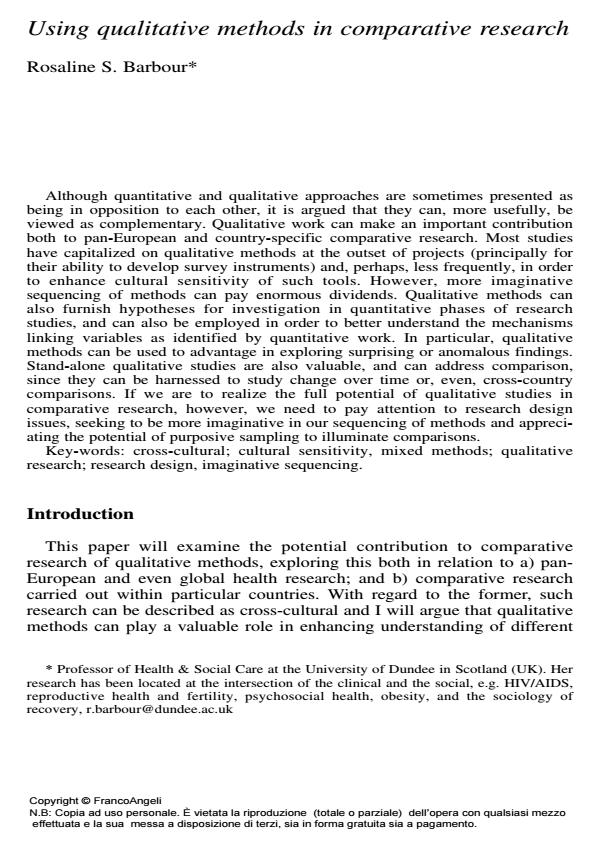Using qualitative methods in comparative research
Titolo Rivista SALUTE E SOCIETÀ
Autori/Curatori Rosaline S. Barbour
Anno di pubblicazione 2010 Fascicolo 2010/suppl. En. 2 Lingua Inglese
Numero pagine 15 P. 65-79 Dimensione file 287 KB
DOI 10.3280/SES2010-SU1005
Il DOI è il codice a barre della proprietà intellettuale: per saperne di più
clicca qui
Qui sotto puoi vedere in anteprima la prima pagina di questo articolo.
Se questo articolo ti interessa, lo puoi acquistare (e scaricare in formato pdf) seguendo le facili indicazioni per acquistare il download credit. Acquista Download Credits per scaricare questo Articolo in formato PDF

FrancoAngeli è membro della Publishers International Linking Association, Inc (PILA)associazione indipendente e non profit per facilitare (attraverso i servizi tecnologici implementati da CrossRef.org) l’accesso degli studiosi ai contenuti digitali nelle pubblicazioni professionali e scientifiche
Although quantitative and qualitative approaches are sometimes presented as being in opposition to each other, it is argued that they can, more usefully, be viewed as complementary. Qualitative work can make an important contribution both to pan-European and country-specific comparative research. Most studies have capitalized on qualitative methods at the outset of projects (principally for their ability to develop survey instruments) and, perhaps, less frequently, in order to enhance cultural sensitivity of such tools. However, more imaginative sequencing of methods can pay enormous dividends. Qualitative methods can also furnish hypotheses for investigation in quantitative phases of research studies, and can also be employed in order to better understand the mechanisms linking variables as identified by quantitative work. In particular, qualitative methods can be used to advantage in exploring surprising or anomalous findings. Stand-alone qualitative studies are also valuable, and can address comparison, since they can be harnessed to study change over time or, even, cross-country comparisons. If we are to realize the full potential of qualitative studies in comparative research, however, we need to pay attention to research design issues, seeking to be more imaginative in our sequencing of methods and appreciating the potential of purposive sampling to illuminate comparisons.
Keywords:Cross-cultural; cultural sensitivity, mixed methods; qualitative research; research design, imaginative sequencing.
Rosaline S. Barbour, Using qualitative methods in comparative research in "SALUTE E SOCIETÀ" suppl. En. 2/2010, pp 65-79, DOI: 10.3280/SES2010-SU1005